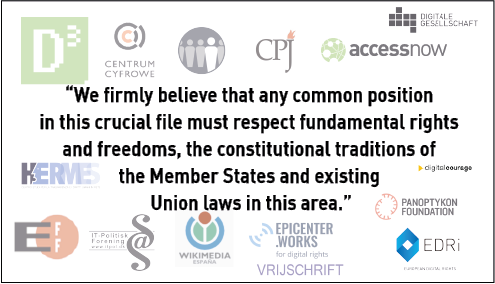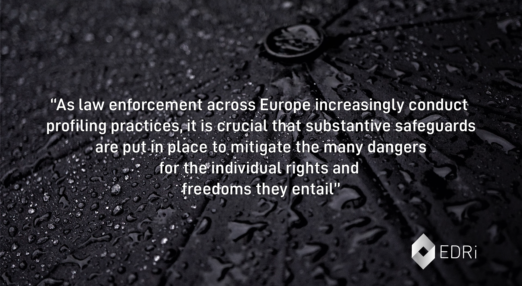Privacy and data protection
Filter resources
-

#PrivacyCamp20: Event Summary
The 8th edition of Privacy Camp revolved in 2020 around the topic of Technology and Activism, the schedule being composed of ten sessions in different formats. What were these about? Read below a summary of each discussion, with references to full session recordings.
Read more
-

Press Release: EDRi calls for fundamental rights-based responses to COVID-19
Read more
-

Facial recognition: Homo Digitalis calls on Greek DPA to speak up
In the spring of 2019, the Hellenic Police signed a €4 million contract with Intracom Telecom, a global telecommunication systems and solutions vendor, for a smart policing project. Seventy five percent of the project is funded by the Internal Security Fund (ISF) 2014-2020 of the European Commission.
Read more
-

Competition law: what to do against Big Tech’s abuse?
This is the second article in a series dealing with competition law and Big Tech. The aim of the series is to look at what competition law has achieved when it comes to protecting our digital rights, where it has failed to deliver on its promises, and how to remedy this.
Read more
-

Surveillance by default: PATRIOT Act extended?
On 15 March, Section 215 of the USA PATRIOT Act, and several other similar legal provisions, were due to expire and begin the process of reform and review to incorporate new legal protections of privacy. However, as a result of a coordinated effort by both chambers of the US Congress, the provisions may be extended for at least 77 days.
Read more
-

Open letter: Civil society urges Member States to respect the principles of the law in Terrorist Content Online Regulation
On 27 March 2020, European Digital Rights (EDRi) and 12 of its member organisations sent an open letter to representatives of Member States in the Council of the EU. In the letter, we voice our deep concern over the proposed legislation on the regulation of terrorist content online and what we view as serious potential threats to fundamental rights of privacy, freedom of expression, etc.
Read more
-

Facial Recognition & Biometric Mass Surveillance: Document Pool
Despite evidence that public facial recognition and other forms of biometric mass surveillance infringe on a wide range EU fundamental rights, European authorities and companies are deploying these systems at a rapid rate. This has happened without proper consideration for how such practices invade people's privacy on an enormous scale; amplify existing inequalities; and undermine democracy, freedom and justice.
Read more
-

EDRi calls for fundamental rights-based responses to COVID-19
Some of the actions taken by governments and businesses under exceptional Coronavirus circumstances today, can have significant repercussions on freedom of expression, privacy and other human rights both today and tomorrow.
Read more
-

Terrorist Content Online Regulation: Time to get things right
Closed-door negotiations (“trilogues”) on the Regulation to prevent the dissemination of terrorist content continue in Brussels. After our open letter from December things have moved on fairly slowly at first, but, recently, new texts are quickly being discussed in order to try to reach an agreement soon. Nonetheless, according to MEP Patrick Breyer, many key issues remain open for discussion.
Read more
-

Stuck under a cloud of suspicion: Profiling in the EU
As facial recognition technologies are gradually rolled out in police departments across Europe, anti-racism groups blow the whistle on the discriminatory over-policing of racialised communities linked to the increasing use of new technologies by law enforcement agents.
Read more
-

Germany: Invading refugees’ phones – security or population control?
In its new study, EDRi member Society for Civil Rights (GFF) examines how German authorities sniff out refugees’ phones. The aim of “data carrier evaluation” is supposed to be determining a person’s identity and their country of origin. However, in reality, it violates refugees’ rights and does not produce any meaningful results.
Read more
-

Accountable Migration Tech: Transparency, governance and oversight
Migration continues to dominate headlines around the world. For example, given the currently deteriorating situation at the border between Greece and Turkey, with reports of increasingly repressive measures to turn people away, new technologies already play a part in border surveillance and decision-making at the border.
Read more
